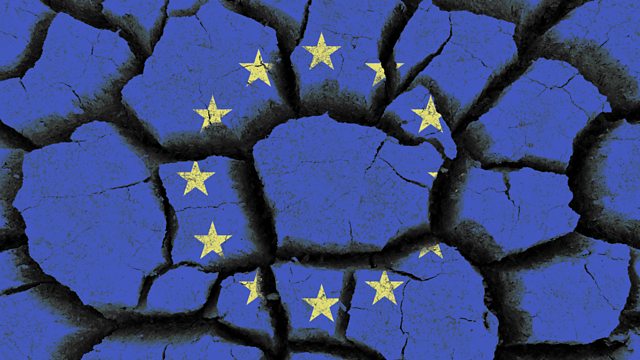
For over half a century, post the second World War, Europe has been integrating. From a few nations in the 1950s, led by France and Germany, the Eurozone grew to 28 countries. Then, with Brexit, 27.
Now, after Brexit, there are rumours the alliance could shrink further as many countries have issues with the ECB’s interest rates and the Commission’s regulatory policies. This would be less relevant if it was Portugal or Slovakia whining, but it’s not those nations. It’s France. The country that has driven the heart of the EU dream.
Speaking at the Berlin Global Dialogue, Emmanuel Macron said Washington and Beijing outstrip the EU in both economic output and investment, and Europe won’t be able to compete with other countries unless it moves quickly to complete a banking union and make global trade rules more fair.
“The EU could die, we are on a verge of a very important moment. Our former model is over — we are over-regulating and under-investing. In the two to three years to come, if we follow our classical agenda, we will be out of the market.”
The issue is that the EU is looking to centralise more, control more, regulate more, manage more and organise more. It’s too much more.
Interestingly Olaf Scholz, the German Chancellor, disagreed with Macron. He feels Europe needs to be more focused on European interests, and is arguing for more protection for Europe’s interest from the threat of America and, specifically, China, by raising tariffs. This is to protect the German car industry which is hugely threatened by China.
French Senator Ronan Le Gleut, president of the Franco-German Senate friendship group, told Politico: “We just don’t have the same interests. We don’t have the same priorities, France’s automobile industry doesn’t export in China, or very little … whereas things like the crisis at Volkswagen worry everyone in Germany.”
Nils Schmid, a German lawmaker for Mr Scholz’s ruling Social Democrats, said: “There is a geopolitical dimension — often the French accuse the Germans of not thinking about geopolitics, but there we feel that they are stuck in their Franco-French thinking.
To solve all of this, Mario Draghi, former president of the European Central Bank and prime minister of Italy, was asked to produce a report on the state of European competitiveness.
Here are the key five points Draghi’s report proposes:
- Closing the Innovation Gap: Europe must focus on closing the innovation gap with the US and China, particularly in advanced technologies. This involves increasing investment in research and innovation, improving the pipeline from innovation to commercialization, and removing regulatory barriers that hinder the growth of innovative companies.
- Decarbonisation and Competitiveness: Europe needs a joint plan to decarbonize its economy while maintaining competitiveness. This includes lowering energy costs, accelerating the deployment of clean energy, and ensuring that EU companies can compete globally in clean technologies.
- Increasing Security and Reducing Dependencies: Europe must reduce its dependencies on critical raw materials and advanced technologies from non-aligned countries. This involves developing a foreign economic policy to secure supply chains, increasing domestic production capacity, and strengthening the EU's defense and space industries.
- Financing Investments: The EU needs to mobilize both private and public finance to meet its investment needs, which are estimated to be around 4.4-4.7% of GDP annually. This requires building a genuine Capital Markets Union, reviving securitization, completing the Banking Union, and potentially issuing common safe assets to fund joint investment projects.
- Strengthening Governance: The EU must reform its institutional setup to enable faster and more coordinated decision-making. This includes establishing a Competitiveness Coordination Framework, extending qualified majority voting in the Council, simplifying regulatory burdens, and ensuring that EU resources are focused on strategic priorities.
In summary, the problem is, according to Draghi’s report, that EU does not invest enough, lacks innovative superpowers, and has been too naive in defending them from international competitors. The solution, according to Draghi, is that the EU needs more EU! More centralisation! More harmonisation! More regulation! More Brussels!
Something is awry.
If Emmanuel Macron is complaining about too much centralisation whilst Scholz is arguing for more protectionism whilst Draghi is saying the EU needs more EU and more centralisation, we have a problem.
The bottom-line is that Europe is not China or America. It is Europe. It is 27 nations, plus partners in the extended union, who try to co-operate and work together as one. But they are not one. They are 27, with different languages and cultures. So, it is interesting to watch the frictions of Europe on the global state taking place today, particularly when Germany and France disagree. Admittedly, they’ve had these spats before and I’m sure they’ll work them out. But it’s not good for certainty and decision making.
Chris M Skinner
Chris Skinner is best known as an independent commentator on the financial markets through his blog, TheFinanser.com, as author of the bestselling book Digital Bank, and Chair of the European networking forum the Financial Services Club. He has been voted one of the most influential people in banking by The Financial Brand (as well as one of the best blogs), a FinTech Titan (Next Bank), one of the Fintech Leaders you need to follow (City AM, Deluxe and Jax Finance), as well as one of the Top 40 most influential people in financial technology by the Wall Street Journal's Financial News. To learn more click here...

